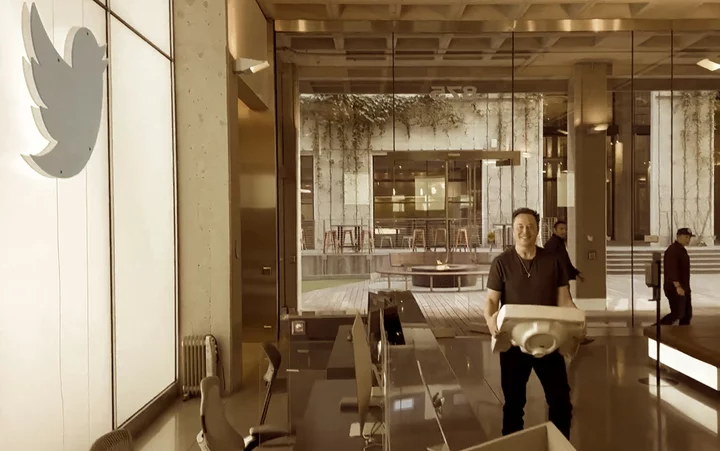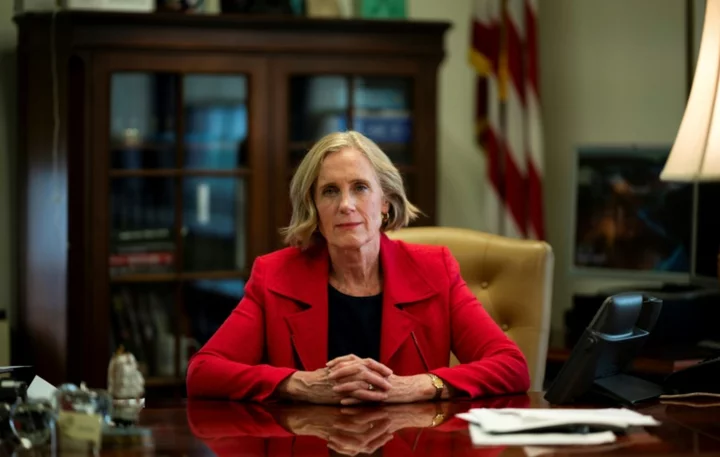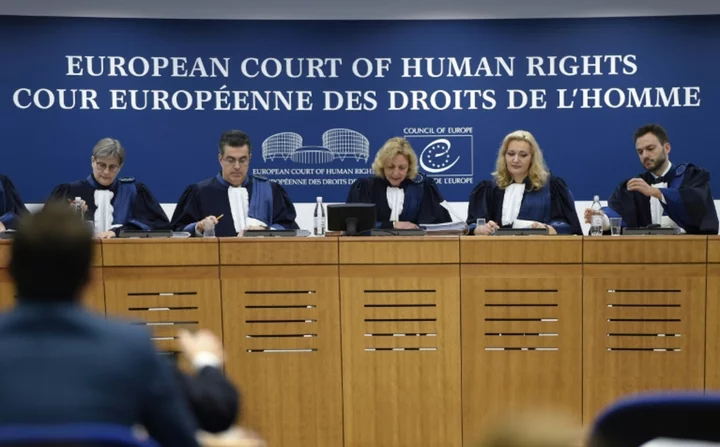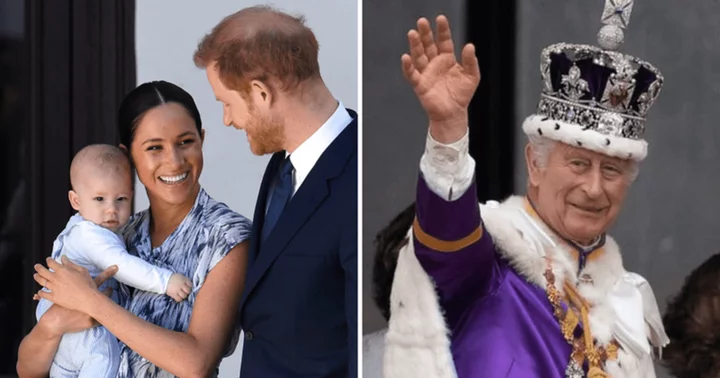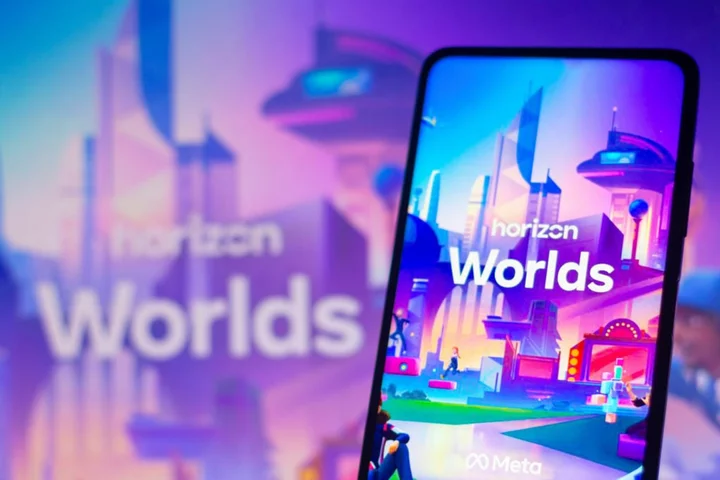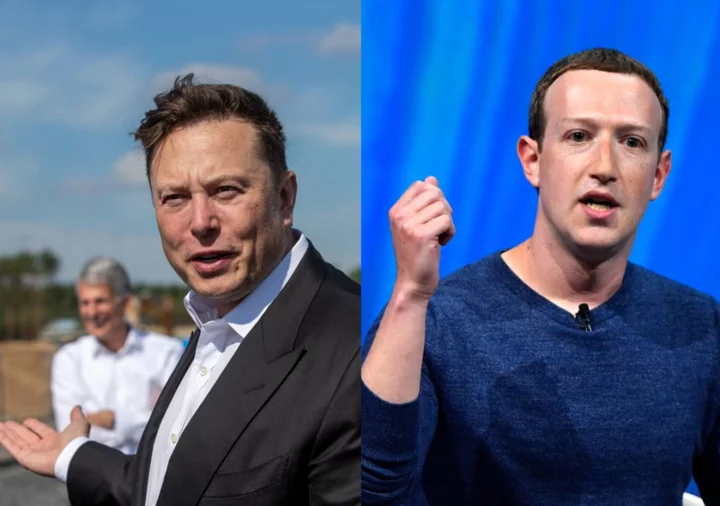What a difference a year makes.
Twelve months ago, Elon Musk carried a chunk of porcelain into Twitter HQ. Revisiting the "let that sink in" video he posted, which was mercilessly mocked at the time, one can almost feel nostalgic about this dad-joke version of the man — a guy who'd just blundered into paying $44 billion for a shiny new toy.
This was before he started suspending the accounts of his critics while elevating conspiracy theories, the GOP, and Russian propaganda. Before he turned Twitter into a dull pay-to-play hellscape. Before Ronan Farrow reported that Musk's recreational use of ketamine has "escalated." Before he made it rain pink slips at HQ from November to February, before he tanked Twitter's ad revenue and traffic, before the site's usefulness as a news source vanished in a haze of hate speech and disinformation, before he drove a stake into the heart of the beloved bird brand itself.
A year on, nothing seems certain about the service. Not the name (we'll cover the war between users who still insist on "Twitter" versus Musk's preferred "X" in a separate story). Not its rapidly-plummeting valuation (Musk says $20 billion; his bankers say $15 billion.) Not its reliability, as the self-policing mechanism called Community Notes struggles to hold back a tsunami of fake Israel-Gaza news. Not whether we'll soon all be forced to pay in order to post.
SEE ALSO: Israel-Hamas disinformation: What it is, how to fight itCertainly, nothing is clear about what's going on in Musk's head. Is he really so blinded by his yes-men, by the paid accounts that swamp his replies, that he can't see the trajectory of this plane? Does he really think he can build a U.S. version of WeChat without the user base, or a digital payment service that will somehow overtake Apple and Google?
Or are we witnessing a deliberate "enshittification," to use author Cory Doctorow's memorable phrase, of a service that for all its faults was once useful for democratic movements around the world? Did Musk set $44 billion on fire to please authoritarians with whom he does business? Presidents Putin, Xi, and Erdogan, to say nothing of election-denying ex-presidents Bolsonaro and Trump, all have reasons to be pleased with Musk's compliant version of the service.
We may not know his motivation for many years. But we can at least look back at the moment when Musk took over and see all the ways in which the subsequent year of chaos were embedded right from the start.
It is time, finally, to take the guy's advice, and let that sink in.
From bad to boos: Musk's formative month in comedy hell
On Oct. 4, 2022 — while Musk was still trying to get out of buying Twitter at the inflated price he'd promised, before a judge forced him to do so — he sent a telling tweet. "Buying Twitter is an accelerant to creating X, the everything app," he wrote.
He may not have had it in for the bird on day one, but Musk's 25-year-long obsession with the "X" brand was evidently on his mind that month.
Still, on the surface, the sink-carrying guy entering Twitter HQ seemed to be the more media-friendly, SNL-hosting version of Musk. The one who has often said he harbored a desire to be a comedian. There were elements of this ambition that were almost adorable, like watching a toddler who's just discovered puns.
As he took the reins, Musk changed his profile photo: It was now him as a child talking into a toy phone. He was owning the fact that he was getting into his followers' replies like a complaints hotline operator (here was the origin of the "concerning" and "looking into it" memes) rather than a CEO. Likewise, when The Verge ran a story titled "Welcome to hell, Elon," Musk playfully changed the location on his profile to "Hell."
But that was as far as Musk was willing to go in allowing himself to be the butt of the joke — and the thinness of his skin then foreshadowed much of what he has become now.
The most telling tweet from that time was not "comedy is now legal on Twitter." We now know that restoring right-wing satire account The Babylon Bee, suspended for misgendering trans people, was one of Musk's top priorities. He claimed he was standing up for comedy, unaware the comedy world was about to bite him in the ass.
No, the tweet that would best describe this utterly mismatched takeover, then as now, was "fragile narcissist buys criticism factory."
Two weeks after Musk took over, the criticism factory went into overdrive. This was when Musk botched his initial rollout of the $8 blue check verification system, and the question of how you can tell if an account is who they say they are was very much on users' minds. When comedian Kathy Griffin illustrated the point by making her account look like Musk's, Musk banned her. Result: a stream of "Elon Musk" accounts. So many, in fact, that Musk was briefly pushed out of the search results for his own name.
"Elon Musk right now is like if Elmer Fudd bought a website of Bugs Bunnies," observed one member of the criticism factory.
Then came the mass layoffs, conducted with such haste that Musk now faces a $500 million class-action lawsuit over unpaid severance. With a tin ear for timing, Musk appeared on stage with comedian Dave Chappelle in San Francisco, Twitter's home, a week after the firings. The plan was that he'd come out and utter his take on a classic Chappelle line: "I'm rich, bitch." But the capacity crowd of 18,000 attendees booed Musk, constantly, for 10 minutes.
This rich, fragile narcissist could have learned the lesson that comedy is funny when the comedian punches up, not down. Instead, he tried to claim there were more cheers than boos, and then doubled down on seeking revenge against his critics.
The Musk mask slips
The attempts at being cute vanished. Gone was the profile photo of phone boy; in its place came the supervillain costume Musk wore for Halloween 2022. On Oct. 30, he tweeted an unfounded conspiracy theory about the attack on Paul Pelosi, husband of former speaker Nancy.
At this point, Musk still had enough shame to delete the tweet when his source turned out to be a well-known conspiracy rag. But after that, his conspiracy theory tweets would remain up. (These include posts attacking George Soros, Anthony Fauci, and Washington Post reporter Taylor Lorenz, among others; defending the "QAnon shaman"; and claiming that the perpetrator of a mass shooting in Texas wasn't a neo-Nazi, even as investigators confirmed he was.)
By December, Musk's "free speech" promises for the platform were falling faster than pine needles. He had promised not to ban the Twitter account that follows his private jet; in fact he did just that, then banned a number of reporters (including Mashable's own Matt Binder) that reported on the fact. He'd promised not to reinstate Trump's account (banned, lest we forget, for fomenting insurrection) without an independent board weighing in; he did it by Twitter poll.
And when another poll found that most users wanted him to step down as CEO, Musk groused about the result — bots, he insisted, though how bots managed to flood this poll but not the Trump one remained a mystery. He promised to "abide by the results," though it would be another six months before advertising veteran Linda Yaccarino was appointed to run the company.
Even then, Musk retained control of the all-important product and engineering teams. Arguably, Yaccarino was COO in all but name. She talked a good game about bringing advertisers back, but she also gave the impression of being blindsided by Musk's impulsive decisions to kill the Twitter brand and to test a $1 charge for new users.
SEE ALSO: Everything you need to know about X CEO Linda Yaccarino's disastrous interviewAnd still the ad revenue tide refused to turn. It was down more than 60 percent year on year, Musk admitted this summer, and has slid every month since. Yaccarino's success stories fell apart on examination: Yes, as she said, Visa has started paying for ads on the service again. What she didn't say: Visa spent just $10 in the past 12 weeks.
How Musk can still win
There's more, of course. All of these disasters barely scratch the surface of Musk's catastrophic first year of ownership. Musk is being sued by multiple vendors, by former employees, by the SEC. The EU is investigating whether Twitter/X is in violation of its Digital Services Act, which could mean massive fines and/or the removal of the service from EU countries altogether.
But so what? Twitter/X is a private company now, subject to its owner's every whim. As part of his purchase, Musk saddled it with billion-dollar-a-year interest payments on the debt he incurred. But according to current world's richest person figures, even if he had to pay every penny of the $44 billion, plus let's say another $2 billion to settle all the lawsuits, Musk would still have somewhere in the realm of $175 billion — slightly ahead of his nearest rival in the "richest man in the world" stakes.
Musk also has a tendency to double down when cornered. In a May interview on CNBC, he testily insisted that posting whatever he wants, including wild conspiracy theories, was worth the reputational and financial hit. "I’ll say what I want to say and if the consequence of that is losing money, so be it," Musk insisted.
He may soon decide it's worth losing every advertiser on the platform. After all, if he sells the company, he'd have to live with the impression that he backed down and fled. The criticism factory would have the former boss in its sights for as long as he lived.
Now that his blue-check army have their tweets prioritized, the Twitter landscape has become a much more dull place. This is reflected in the slow decline of active users, something even Yaccarino has confirmed. Analysis by SimilarWeb says Twitter/X visits were down around 600 million in the month of September compared to October.
But again, so what? When you're a fragile narcissist, all that matters is what you see in your replies. And thanks to the blue-checks, now a mostly self-selected group of adoring Musk fans, the weather in his mentions is beautiful. It's sycophants applauding and posting AI-generated art of Musk the muscular hero.
As far as most of us can see, Musk keeps posting Ls, and the Ls become sadder and sadder. He backed down from a proposed fight with rival Mark Zuckerberg, claiming a bad back. He went to the border for a photo op and wore his cowboy hat backwards, then posted a video that showed he has no idea how to handle heavy weaponry.
This too was foretold by those crucial first months at the helm: Musk posted a picture of guns on his nightstand in December 2022, which led to widespread mockery of his "divorced dad energy." All that has changed is that Musk is a gun-toting macho legend in his most prominent replies. The mockery is still there, but buried. When thousands of strangers are reinforcing your midlife crisis every day, who needs therapy?
Besides, there's one other fact that the traffic decline stats tell us: Twitter/X is remarkably resilient. It's hard to imagine how Musk's first year could have gone worse, and yet the service still has north of 200 million daily active users.
Likewise, it's hard to imagine a rival better placed to steal those users than Meta, which built Threads atop the Instagram social graph. And still, even after an incredibly promising start, Threads' growth has cratered. (That may change if Threads ever launches in the EU, but Zuckerberg is currently facing his own DSA investigation over Israel-Hamas disinformation on Facebook).
Many power users have left Twitter/X, but many still remain. NPR, stupidly labeled "state-affiliated media" by Musk, quit the platform in April and now says it has seen no drop in website visits; now that Musk has removed headlines from tweets, many other media organizations have little reason to stay. And yet, we do not move. My assessment from last year — that even Musk cannot snuff out Twitter's ever-burning trash fire — may yet turn out to be correct.
And if Musk ever does actually approach a situation where his ownership is a financial burden? Well, then he can always try returning to his purchase-day persona. The bar is set incredibly low now; so much so that an innocuous dad joke stunt would make Musk look relatively normal. Advertisers, regulators, and users may conclude he's turned a corner. For the price of ditching a conspiracy tweet or two, Musk could yet be in the clear and control the monopoly microblogging service formerly known as Twitter for the rest of his life.
Let that sink in.

